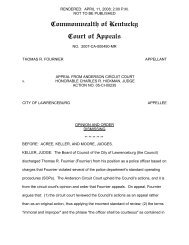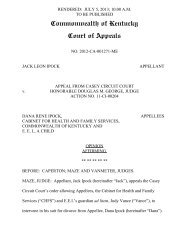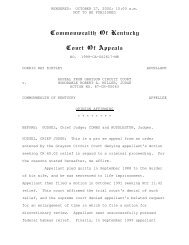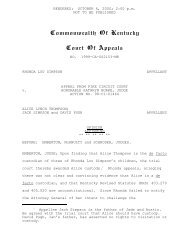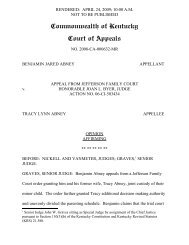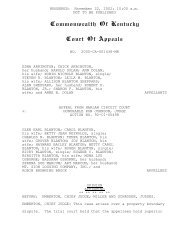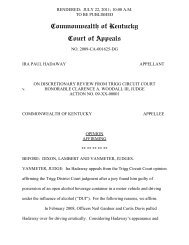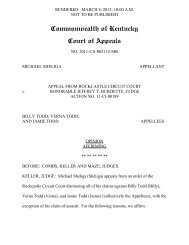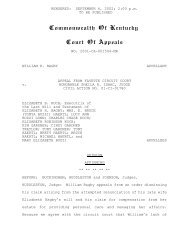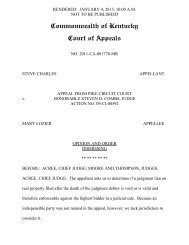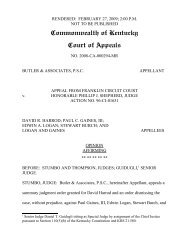Commonwealth of Kentucky Court of Appeals - Justia
Commonwealth of Kentucky Court of Appeals - Justia
Commonwealth of Kentucky Court of Appeals - Justia
Create successful ePaper yourself
Turn your PDF publications into a flip-book with our unique Google optimized e-Paper software.
RENDERED: FEBRUARY 12, 2010; 10:00 A.M.<br />
NOT TO BE PUBLISHED<br />
<strong>Commonwealth</strong> <strong>of</strong> <strong>Kentucky</strong><br />
<strong>Court</strong> <strong>of</strong> <strong>Appeals</strong><br />
NO. 2009-CA-001539-ME<br />
BRIDGET DASCH APPELLANT<br />
APPEAL FROM FAYETTE CIRCUIT COURT<br />
v. HONORABLE LUCINDA CRONIN MASTERTON, JUDGE<br />
ACTION NO. 05-D-00133<br />
STEVE KELLEY ON BEHALF OF THE<br />
MINOR CHILDREN CAILIN KELLEY<br />
AND CONOR KELLEY APPELLEE<br />
OPINION<br />
VACATING AND REMANDING<br />
** ** ** ** **<br />
BEFORE: CLAYTON AND NICKELL, JUDGES; KNOPF, 1 SENIOR JUDGE.<br />
CLAYTON, JUDGE: Bridget Dasch appeals the August 12, 2009, domestic<br />
violence order (“DVO”) entered by the Fayette Family <strong>Court</strong>. Steve Kelley,<br />
1 Senior Judge William L. Knopf sitting as Special Judge by assignment <strong>of</strong> the Chief Justice<br />
pursuant to Section 110(5)(b) <strong>of</strong> the <strong>Kentucky</strong> Constitution and <strong>Kentucky</strong> Revised Statutes<br />
(KRS) 21.580.
Dasch’s former husband, obtained the DVO on behalf <strong>of</strong> their two children. For<br />
the following reasons, we vacate and remand for dismissal.<br />
FACTUAL AND PROCEDURAL BACKGROUND<br />
The marriage between Kelley and Dasch was dissolved in Fayette<br />
Circuit <strong>Court</strong> on December 27, 2006. During their marriage, they had a son and a<br />
daughter, who, at the time <strong>of</strong> the incident, were six and three, respectively. Under<br />
the provisions <strong>of</strong> the settlement agreement, which was incorporated into the decree<br />
<strong>of</strong> dissolution, the parents shared joint custody and Kelley’s timesharing<br />
arrangement was to have the children every other weekend plus Tuesday and<br />
Thursday evening from 5:00 p.m. until 8:30 p.m.<br />
Since the entry <strong>of</strong> the decree, the record shows that Dasch and Kelley<br />
have a long court history that is divisive and adversarial. In April 2009, Dasch<br />
learned that she would be relocating to Florida because <strong>of</strong> her current husband’s<br />
military commitment. She immediately gave notice to Kelley about the move so<br />
that they could revise the timesharing plan. Although they have participated in<br />
mediation about a change in timesharing, no agreement has been reached between<br />
them. Kelley, however, has not filed a motion with the court to change the<br />
timesharing arrangement.<br />
Kelley filed a petition for a DVO on July 24, 2009, against Dasch on<br />
behalf <strong>of</strong> the children. On the evening prior to Kelley filing the emergency<br />
protective order (“EPO”) petition, he discovered red marks on his daughter’s<br />
bottom while preparing the children for a bath. He reported that, after discovering<br />
-2-
the red marks, he asked his son what had happened. Apparently, his son told him<br />
that Dasch had yanked his sister by the hair from the tub and spanked her for a<br />
long time. In addition, the little boy supposedly told Kelley that his mother told<br />
him not to tell anyone and that, if he did, he would be in trouble.<br />
Kelley then contacted his attorney who advised him to take the<br />
children to the emergency room and contact the Cabinet for Health and Family<br />
Services (“Cabinet”). Nonetheless, he did not contact Dasch after discovery <strong>of</strong> the<br />
red marks or inform her that he was taking the children to the hospital. She only<br />
learned the children’s whereabouts when dad did not return them after his<br />
scheduled timesharing. In fact, Dasch had to contact Kelley to find out that the<br />
children were at the hospital.<br />
In the petition for the DVO, Kelley alleged that Dasch had severely<br />
spanked her daughter when she discovered that the little girl had painted the<br />
bathroom with red fingernail polish. Further, he claimed he was fearful that she<br />
might lose control again and physically punish the children. Thereafter, an EPO<br />
was issued by the family court and a hearing on the petition was scheduled for<br />
August 3, 2009. The EPO awarded temporary custody <strong>of</strong> the children to Kelley.<br />
Subsequently, the hearing was rescheduled to August 12, 2009, at the request <strong>of</strong><br />
the father.<br />
At the hearing, Kelley put on three witnesses – himself and two<br />
Cabinet social workers. During Kelly’s testimony about the statements his son<br />
made to about the incident, Dasch objected to Kelley’s testimony on the basis that<br />
-3-
it was hearsay. Initially, the court sustained the hearsay objection but later re-<br />
evaluated this ruling. After the re-evaluation, the court ruled that the son’s<br />
statements to the father regarding the incident were admissible under the hearsay<br />
exceptions for statements made for the purpose <strong>of</strong> medical treatment and exited<br />
utterance. Dad then testified as to the son’s description <strong>of</strong> the event.<br />
His next witness was Sonya Tanksley, an investigative social worker<br />
for the Cabinet, who was on-call the night <strong>of</strong> the incident. Tanksley said that upon<br />
her arrival at the hospital she spoke with the six-year old son who said that his<br />
mother grabbed his sister by the hair out <strong>of</strong> the tub and spanked her for a long time.<br />
Tanksley, however, never spoke directly to the parties’ daughter. Additionally,<br />
Tanksley stated that red marks like those on the little girl’s bottom typically show<br />
that the injury is new and conceded that the children had been with dad prior to<br />
going to the hospital. After conferring with her Cabinet supervisor, Tanksley was<br />
instructed to send the children home with Kelley for the night. Tanksley admitted<br />
that she did not review the couple’s court records prior to sending the children<br />
home with the dad. Tanksley also testified that on that evening she also spoke with<br />
Dasch at the hospital. She described Dasch as upset and added that Dasch did not<br />
want the children to go home with dad. According to Tanksley, Dasch was not<br />
cooperative.<br />
Kelley’s last witness was Lashonda Jackson, an investigative<br />
caseworker for the Cabinet. She said that she went to see dad, mom, and the<br />
children four days after the hospital visit. Jackson commented on the day <strong>of</strong> her<br />
-4-
visit the marks had faded with some slight bruising in the area. As was the case<br />
with Tanksley, Jackson had not reviewed the parties’ court records prior to meeting<br />
with everyone. Importantly, Jackson opined that, although it was her belief that<br />
mother did spank the child, she also thought that the spanking was a one-time<br />
event, would not occur again, mom was not a danger to the children and would not<br />
physically punish the children again. Interestingly, neither Cabinet social worker<br />
chose to remove Dasch’s infant daughter from her during the pendency <strong>of</strong> the<br />
action. At the end <strong>of</strong> Kelley’s case, Dasch moved for a directed verdict, which the<br />
court denied.<br />
Next, Dasch presented her case. She stated that she never spanked her<br />
children and did not believe in corporal punishment. Further, Dasch explained that<br />
in the past she has requested several times that Kelley and his wife not spank the<br />
children. On the day in question, she was preparing to bath the children when she<br />
discovered that her daughter had painted the bathroom with nail polish. While<br />
Dasch admitted raising her voice to her daughter, she claimed that she sent her<br />
daughter to her bedroom but did not spank her. At that time, Dasch called a<br />
neighbor to get advice on how to remove the polish. Apparently, the neighbor<br />
asked if she had spanked the child, and Dasch said that she had not. She, then,<br />
pursuant to the timesharing agreement with Kelley, delivered the children to him.<br />
Dasch also testified that there was a long history <strong>of</strong> dad making accusations against<br />
her when things did not go his way, and this incident was not the first time that<br />
Kelley made a complaint about her to the Cabinet.<br />
-5-
Next, Jonathan Keller testified on behalf <strong>of</strong> Dasch. He was the next<br />
door neighbor that she called to get advice about nail polish removal. Keller<br />
corroborated her testimony and said that when he asked her if she spanked the little<br />
girl, Dasch said that she had not spanked her daughter as that would not have been<br />
helpful. Keller, further, said that he had never seen her spank her children and that<br />
he knew she had a strong aversion to corporal punishment. Dasch’s next witness<br />
was Brenda Mulcahy. Mulcahy had been supervising mom’s visit with the<br />
children since the issuance <strong>of</strong> the EPO. Mulcahy said she had never seen Dasch<br />
spank her children and found it hard to believe mom would spank them.<br />
At the end <strong>of</strong> the testimony, the court entered its finding that it<br />
believed that mom spanked the child, and additionally, the court found that the<br />
mother’s denial <strong>of</strong> the spanking indicated that an act <strong>of</strong> domestic violence was<br />
likely to occur again. Then, the court went on to order a modification <strong>of</strong> the<br />
timesharing between the parties. Previously, Kelley had the children every other<br />
weekend from Friday night to Sunday night plus every Tuesday and Thursday<br />
evening from 5:00 to 8:30 p.m. The court, however, although making no finding<br />
that it was in the best interest <strong>of</strong> the children to modify the timesharing, changed<br />
the timesharing agreement and provided Kelley with more time. In the DVO,<br />
Dasch was ordered to: 1) not commit further acts <strong>of</strong> domestic violence and abuse;<br />
2) not dispose <strong>of</strong> or damage any property <strong>of</strong> the parties; 3) receive assessment and<br />
treatment; and also, the DVO modified the timesharing so that Kelley now had the<br />
children after school on Tuesday and Thursday, including overnight, and every<br />
-6-
other weekend through the Monday morning. The DVO was ordered in effect until<br />
August 12, 2012. This appeal follows.<br />
ISSUE<br />
Dasch contends that, the court’s findings in the case are flawed. First,<br />
she contends that the DVO failed to meet the standard set forth in KRS 403.750.<br />
Next, Dasch maintains that the court erred by failing to grant her motion for<br />
directed verdict at the close <strong>of</strong> Kelley’s case. Furthermore, she claims the court<br />
incorrectly entered evidence, which could be characterized as hearsay, on two<br />
different occasions. Finally, Dasch makes the case that the court erred by<br />
modifying the timesharing agreement between the parties in a manner that is<br />
inconsistent with KRS 403.320 and 403.270. Conversely, Kelley argues that<br />
sufficient evidence existed for the entry <strong>of</strong> the DVO; the court properly denied the<br />
motion for directed verdict; the purported hearsay evidence was properly admitted;<br />
and lastly, the court properly modified the timesharing arrangement.<br />
STANDARD OF REVIEW<br />
The appellate standard <strong>of</strong> review for a family court's factual<br />
determinations is whether the findings were clearly erroneous. Reichle v. Reichle,<br />
719 S.W.2d 442, 444 (Ky. 1986). Findings are not clearly erroneous if they are<br />
supported by substantial evidence. Moore v. Asente, 110 S.W.3d 336, 354 (Ky.<br />
2003). Substantial evidence is evidence <strong>of</strong> sufficient probative value that permits a<br />
reasonable mind to accept as adequate the factual determinations <strong>of</strong> the trial court.<br />
Id. Finally, a reviewing court shall not set aside findings <strong>of</strong> fact unless clearly<br />
-7-
erroneous, and shall give due regard to the opportunity <strong>of</strong> the trial court to judge<br />
the credibility <strong>of</strong> the witnesses. <strong>Kentucky</strong> Rules <strong>of</strong> Civil Procedure (CR) 52.01.<br />
ANALYSIS<br />
Prior to entry <strong>of</strong> a DVO, the court must find “from a preponderance <strong>of</strong><br />
the evidence that an act or acts <strong>of</strong> domestic violence and abuse have occurred and<br />
may again occur[.]” KRS 403.750(1). “The preponderance <strong>of</strong> the evidence<br />
standard is met when sufficient evidence establishes that the alleged victim ‘was<br />
more likely than not to have been a victim <strong>of</strong> domestic violence.’” Baird v. Baird,<br />
234 S.W.3d 385, 387 (Ky. App. 2007). In addition, <strong>Kentucky</strong> statutory law<br />
defines “‘[d]omestic violence and abuse’ [as] physical injury, serious physical<br />
injury, sexual abuse, assault, or the infliction <strong>of</strong> fear <strong>of</strong> imminent physical injury,<br />
serious physical injury, sexual abuse, or assault between family members or<br />
members <strong>of</strong> an unmarried couple[.]” KRS 403.720(1).<br />
As discussed in Rankin v. Criswell, 277 S.W.3d 621, 624 (Ky. App.<br />
2008), domestic violence proceedings are not criminal matters, but the<br />
consequence for both parties are very significant. The consequences <strong>of</strong> the court<br />
granting a DVO to both parties was artfully described in Wright v. Wright, 181<br />
S.W.3d 49, 52 (Ky. App. 2005):<br />
If granted, it may afford the victim protection from<br />
physical, emotional, and psychological injury, as well as<br />
from sexual abuse or even death. It may further provide<br />
the victim an opportunity to move forward in establishing<br />
a new life away from an abusive relationship. In many<br />
cases, it provides a victim with a court order determining<br />
custody, visitation and child support, which he or she<br />
-8-
might not otherwise be able to obtain. The full impact <strong>of</strong><br />
EPOs and DVOs are not always immediately seen, but<br />
the protection and hope they provide can have lasting<br />
effects on the victim and his or her family.<br />
On the other hand, the impact <strong>of</strong> having an EPO or<br />
DVO entered improperly, hastily, or without a valid basis<br />
can have a devastating effect on the alleged perpetrator.<br />
To have the legal system manipulated in order to “win”<br />
the first battle <strong>of</strong> a divorce, custody, or criminal<br />
proceeding, or in order to get “one-up” on the other party<br />
is just as <strong>of</strong>fensive as domestic violence itself. From the<br />
prospect <strong>of</strong> an individual improperly accused <strong>of</strong> such<br />
behavior, the fairness, justice, impartiality, and equality<br />
promised by our judicial system is destroyed. In<br />
addition, there are severe consequences, such as the<br />
immediate loss <strong>of</strong> one's children, home, financial<br />
resources, employment, and dignity. Further, one<br />
becomes subject to immediate arrest, imprisonment, and<br />
incarceration for up to one year for the violation <strong>of</strong> a<br />
court order, no matter what the situation or circumstances<br />
might be.<br />
Thus, we conclude, notwithstanding the large numbers <strong>of</strong> domestic violence cases<br />
in family courts, it is still paramount that the courts provide each party with a full<br />
evidentiary hearing.<br />
In examining this record, we must ascertain whether the court<br />
accurately determined that Kelly met the burden <strong>of</strong> pro<strong>of</strong> by a preponderance <strong>of</strong><br />
the evidence. The pro<strong>of</strong> must have established that Dasch inflicted an act <strong>of</strong><br />
domestic violence on her children and may do so again. Clearly, the parties<br />
dispute the most essential element <strong>of</strong> the case – whether Dasch spanked her<br />
daughter. The record contains a picture <strong>of</strong> the child’s injury, which cannot be<br />
contraverted. But Dasch denies spanking the child and provided testimony from a<br />
-9-
contemporaneous witness, Keller, who spoke with her on the phone immediately<br />
following the nail polish incident. He says that, following his query about whether<br />
Dasch spanked the little girl, Dasch denied doing so. In short, dad says she<br />
spanked the little girl, and mom says she did not spank her.<br />
Furthermore, all evidence presented to the court about the actual act <strong>of</strong><br />
domestic violence was based on the secondhand statements <strong>of</strong> Kelley and Dasch’s<br />
six-year old son. Besides the picture <strong>of</strong> the child’s bottom, the only evidence in<br />
this case was the son’s statements. In other words, the court never heard directly<br />
from the child. While we are not suggesting the child should have been required to<br />
testify, the nature <strong>of</strong> the evidence, reports <strong>of</strong> his statements, weakens the reliability<br />
<strong>of</strong> the pro<strong>of</strong> about what happened.<br />
Moreover, we cannot fail to recognize that the parties were engaged in<br />
a very contentious relationship. Kelley and Dasch appeared to be in constant<br />
conflict about the children including disputes about the children’s discipline,<br />
timesharing arrangement, and medical treatment. Moreover, regarding past<br />
domestic violence, the only previous protective order was one to protect Dasch.<br />
And, according to both parties, Kelley was the one who used corporal punishment<br />
against the children. Further, they had sought court and state intervention on more<br />
than one occasion. In fact, we find it worthy to note that around 7:00 p.m., minutes<br />
before the father reported his daughter’s red bottom to his attorney, he emailed<br />
Dasch about a timesharing issue.<br />
-10-
As previously referred to, “[t]he preponderance <strong>of</strong> the evidence<br />
standard is met when sufficient evidence establishes that the alleged victim ‘was<br />
more likely than not to have been a victim <strong>of</strong> domestic violence.’” Baird, 234<br />
S.W.3d at 387. It is our task to determine whether the court’s finding that the<br />
mother committed an act <strong>of</strong> domestic violence is supported by substantial<br />
evidence; that is, “evidence <strong>of</strong> substance and relevant consequence having the<br />
fitness to induce conviction in the minds <strong>of</strong> reasonable men.” Owens-Corning<br />
Fiberglas Corp. v. Golightly, 976 S.W.2d 409, 414 (Ky. 1998) (citing <strong>Kentucky</strong><br />
State Racing Commission v. Fuller, 481 S.W.2d 298, 308 (Ky. 1972)). Although a<br />
different finding might or been made whether that the mother committed an act <strong>of</strong><br />
domestic violence, we will not substitute our opinion for that <strong>of</strong> the court.<br />
Therefore, we accept the court’s finding on that issue.<br />
But now we address the second element necessary for the issuance <strong>of</strong><br />
a domestic violence order, that is, the court must also find that such an act “may<br />
again occur.” With regard to the second element, the evidence is extremely weak<br />
and virtually non-existent. Granted the likelihood <strong>of</strong> future domestic violence is a<br />
difficult element to prove, nonetheless, in making such a determination, a court is<br />
able to consider the nature and extent <strong>of</strong> the underlying act <strong>of</strong> domestic violence,<br />
any past history <strong>of</strong> domestic violence or protective orders, and the petitioner's<br />
reasonable fear <strong>of</strong> the perpetrator based upon past actions. First, examining the act<br />
itself, we observe that it was a spanking which was a one time event. The past<br />
history between the parties shows no previous domestic violence by the mother.<br />
-11-
Indeed, the only past history is that the father has spanked the children before, and<br />
the mother had a DVO against him to protect herself. Finally, in terms <strong>of</strong> the<br />
children’s fear <strong>of</strong> the mother, the only party that testified that the children feared<br />
the mother was Kelley. Other witnesses claimed that the children’s behavior<br />
showed that they wanted to be with their mother. Kelley himself admitted that he<br />
had never seen Dasch spank the children and he knew she was against corporal<br />
punishment. Finally, and most significant, Kelley’s own witness, Jackson, the on-<br />
going social worker in the case stated that she believed that the spanking was a<br />
one-time, isolated occurrence, and would not occur again. Jackson went on to say<br />
that mom was not a danger to the children and would not physically punish the<br />
children again. The court’s opinion was that the mother’s denial about the<br />
spanking compelled a finding that abuse might occur again. In light <strong>of</strong> the record<br />
and the testimony, we believe that substantial evidence was not provided to support<br />
the family court's conclusion that an act <strong>of</strong> domestic violence may occur in the<br />
future, and that the court’s finding were erroneous on that element. Consequently,<br />
we vacate the DVO.<br />
Although the remaining contested issues are moot as we have vacated<br />
the DVO, we will briefly address them. Dasch argues that her motion for directed<br />
verdict at the close <strong>of</strong> Kelley’s case should have been granted. For a trial court to<br />
grant a directed verdict the requirements are to “consider the evidence in its<br />
strongest light in favor <strong>of</strong> the party against whom the motion was made and must<br />
give [that party] the advantage <strong>of</strong> every fair and reasonable intendment that the<br />
-12-
evidence can justify.” Lambert v. Franklin Real Estate Co., 37 S.W.3d 770, 775<br />
(Ky. App. 2000) (quoting Lovins v. Napier, 814 S.W.2d 921, 922 (Ky. 1991).<br />
Given that “a trial judge cannot enter a directed verdict unless there is a complete<br />
absence <strong>of</strong> pro<strong>of</strong> on a material issue or if no disputed issues <strong>of</strong> fact exist upon<br />
which reasonable minds could differ[,]” we believe, in the case at hand, that the<br />
court did not err in denying the directed verdict motion. Bierman v. Klapheke, 967<br />
S.W.2d 16, 18-19 (Ky. 1998).<br />
Second, we recognize that a dispute existed as to whether certain<br />
statements by Kelley were properly admitted under exceptions to the hearsay rules.<br />
Clearly, a DVO petition is subject to the same evidentiary standards as other forms<br />
<strong>of</strong> evidence. See Dawson v. Com., 867 S.W.2d 493, 496-497 (Ky. App. 1993).<br />
Here, having reviewed the record, listened to the hearing, and reviewed the briefs,<br />
we observed that the issue and the rulings are very confusing. Since we have<br />
vacated the DVO, it is not necessary for us to make a determination as to the<br />
correctness <strong>of</strong> the court’s rulings on hearsay. Furthermore, Dasch did not object to<br />
the social workers’ testimony about what her son said to them so that the issue was<br />
not preserved for our review and, as such, is harmless error. But we must caution<br />
that it is imperative for trial courts to allow only admissable statements under the<br />
evidentiary rules.<br />
The final issue for our review is whether the court erred in modifying<br />
the timesharing agreement between the parties. As we are vacating the DVO, the<br />
modification <strong>of</strong> the timesharing agreement reverts to the previous agreement and<br />
-13-
our discussion has no impact. Nonetheless, we believe that the court erred in its<br />
modification <strong>of</strong> the timesharing based on the DVO petition. After the court<br />
entered the DVO, it entertained the in-court request by Kelley to modify the<br />
timesharing. Although a court through a DVO is permitted to modify the custody<br />
and visitation arrangements under KRS 403.750, KRS 403.320, and KRS 403.270,<br />
it must comply with the formalities imposed by these statutes. Here, the family<br />
court did not comply with them. The hearing itself shows that dad requested a<br />
change in timesharing, and his request was granted. Nothing was stated showing<br />
the change to be related to the entry <strong>of</strong> the DVO or in the best interests <strong>of</strong> the<br />
children. It is imperative that if timesharing arrangements are to be changed<br />
through the DVO process, the court follow the statutory strictures, provide a<br />
rationale for ordering temporary custody and show it is in the best interest <strong>of</strong> the<br />
children.<br />
CONCLUSION<br />
Despite our usual deference to a trial court's factual findings, in this<br />
case, we conclude that the court’s finding about whether domestic violence may<br />
occur again is clearly erroneous as the appellant did not meet the preponderance <strong>of</strong><br />
evidence standard. Accordingly, we vacate the DVO entered against Dasch and<br />
remand this case to Fayette Family <strong>Court</strong> for entry <strong>of</strong> an order dismissing the<br />
August 12, 2009 DVO.<br />
ALL CONCUR.<br />
-14-
BRIEF FOR APPELLANT:<br />
Jennifer McVay Martin<br />
Lexington, <strong>Kentucky</strong><br />
BRIEF FOR APPELLEE:<br />
Catherine Ann Monzingo<br />
Lexington, <strong>Kentucky</strong><br />
-15-



